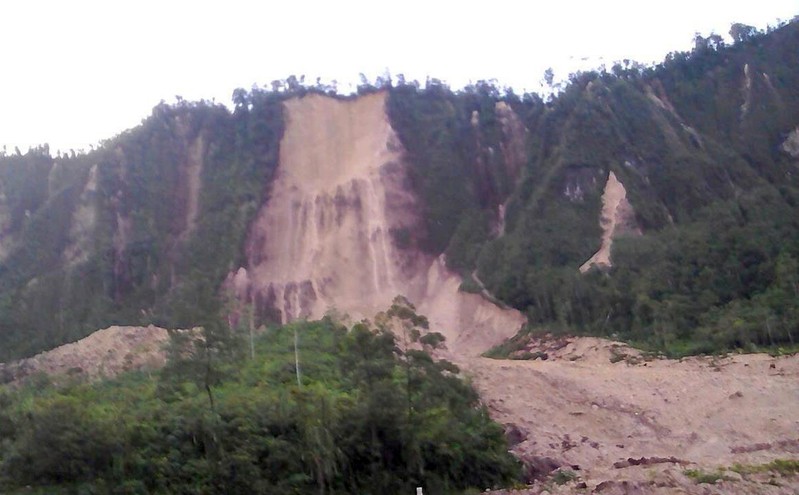
A supplied image shows a landslide and damage to a road located near the township of Tabubil after an earthquake that struck Papua New Guinea’s Southern Highlands, February 26, 2018. Jerome Kay/Handout via REUTERS
February 26, 2018
By Charlotte Greenfield and Sonali Paul
WELLINGTON/MELBOURNE (Reuters) – A powerful 7.5-magnitude earthquake struck Papua New Guinea’s Southern Highlands province early on Monday, the U.S. Geological Survey (USGS) said, prompting oil and gas companies to immediately suspend operations in the energy-rich interior.
The tremor hit near the center of Papua New Guinea’s main island around 560 km (350 miles) from the capital, Port Moresby, at around 3.45 a.m. local time (1545 GMT Sunday), according to the USGS. It was about 35 km (22 miles) deep.
A spokesman at Papua New Guinea’s National Disaster Center said by telephone the affected area was very remote and the agency could not properly assess damage until communication was re-established. He said there were no confirmed casualties.
Udaya Regmi, the head of the International Red Cross in Papua New Guinea, said communications were “completely down” in Tari, one of the larger settlements near the quake’s epicenter.
The Pacific Tsunami Warning Center in Hawaii said there was no risk of a tsunami in the aftermath of the quake.
ExxonMobil Corp said it had shut its Hides gas conditioning plant, close to the quake’s epicenter, to assess any damage.
“All of ExxonMobil PNG Limited’s employees and contractors at its Hides facilities have been accounted for and we are pleased to report they are all safe,” ExxonMobil’s PNG spokeswoman said in an email.
Gas is processed at Hides and transported along a 700 km (435 miles) line that feeds a liquefied natural gas plant near Port Moresby for shipping.
PNG oil and gas explorer Oil Search said in a statement it had shut production in the quake-affected area and there had been several aftershocks with magnitudes greater than five.
It said there were no reports of injuries.
Several aid and missionary agencies said poor communications in the densely forested area made damage and injury assessment difficult.
“The bush structures that they build tend to handle earthquakes extremely well,” Christian missionary Brandon Buser told Reuters after contacting several remote villages by shortwave radio.
Earthquakes are common in Papua New Guinea, which sits on the Pacific’s “Ring of Fire”, a hotspot for seismic activity due to friction between tectonic plates.
“This is the Papuan fold-and-thrust belt, so it’s a typical movement of faults in that region, but it’s big,” said Chris McKee, acting director of the Geohazards Management Division in Port Moresby.
(Reporting by Charlotte Greenfield in WELLINGTON and Sonali Paul in MELBOURNE; Writing by Jonathan Barrett; Editing by Daniel Wallis, David Evans and Paul Tait)
